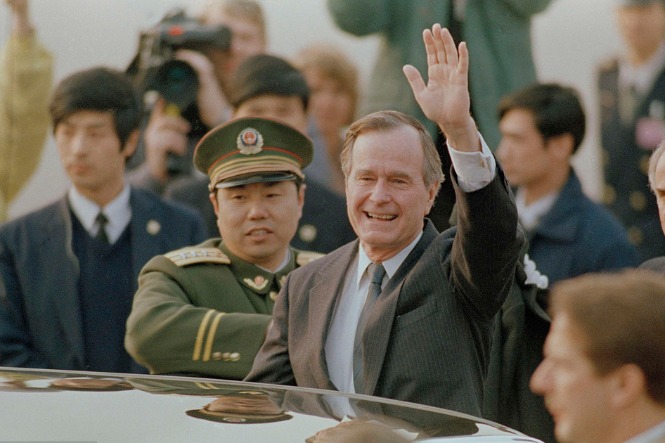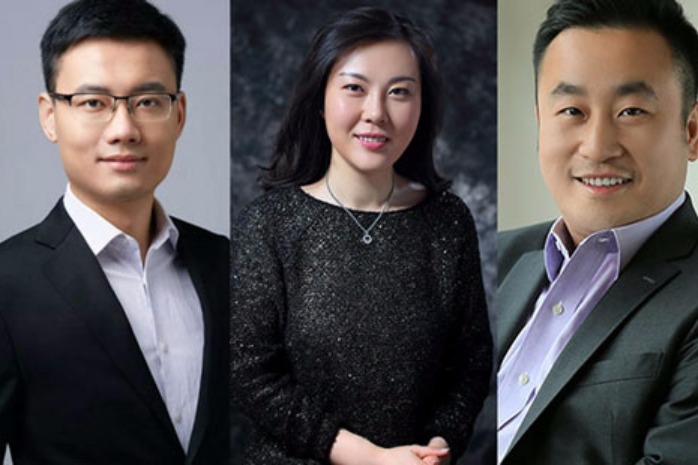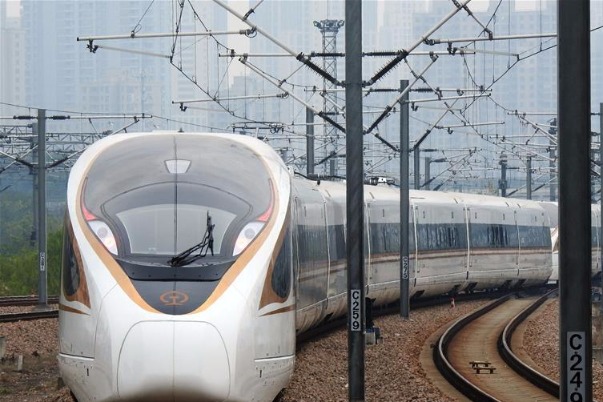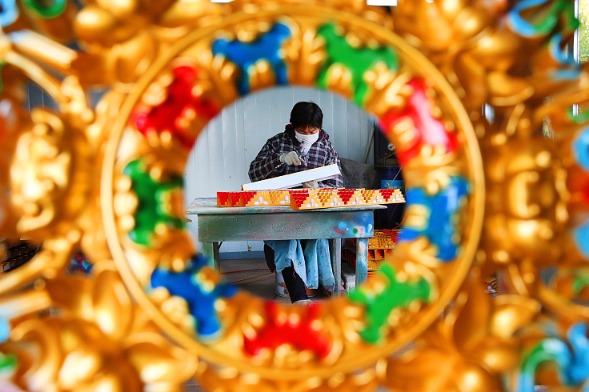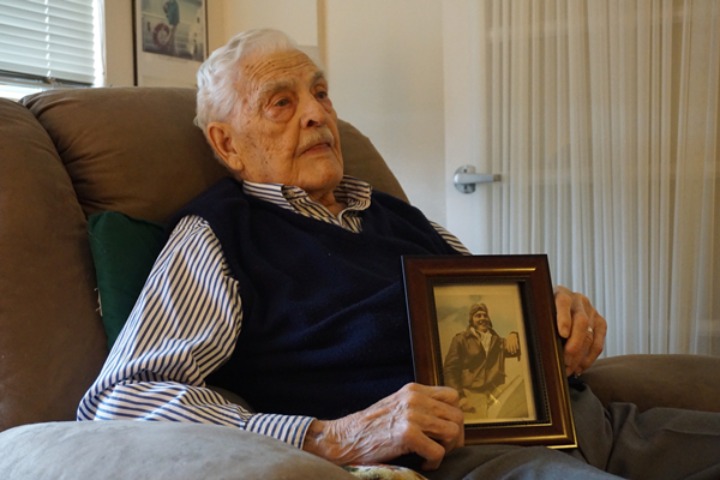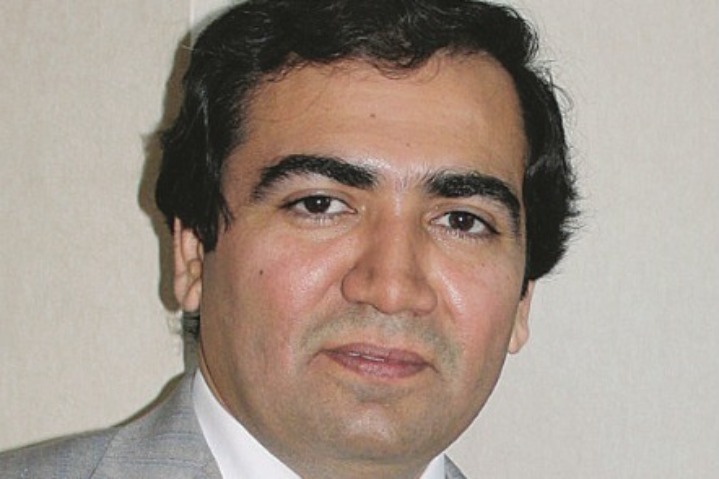Robert Daly: Many of his paths lead to China
|
Robert Daly, director of the Kissinger Center on China and the United States at the Wilson Center, talks to China Daily in his office. Chen Weihua / China Daily |
When Robert Daly graduated from Syracuse University in 1984, he was looking for a job that he hoped could let him travel the world.
Clearly that of diplomat fit the profile. So he took the Foreign Service exam in 1984, passed it, and became a diplomat in 1986.
The young Daly was sent to China in the summer of 1987, despite having never taken any classes related to China or international relations. Neither had he studied the Chinese language in school. His major at Syracuse was drawing cartoon illustrations and American literature.
"I don't know how I got it," Daly recalled, saying it was luck all the way.
No prior knowledge

Growing up in Syracuse in the 1960s and 1970s, Daly said the first thing he heard about China was children's racist songs demeaning the Chinese for being mean.
But the TV show - The Amazing Chan and the Chan Clan - that he watched in the 1970s had portrayed the Chinese in a more positive light.
The first novel Daly read as a 10-year-old also happened to be a children's book about World War II-era China, called House of Sixty Fathers.
That was all the exposure to China that Daly got in Syracuse.
When he embarked on his first diplomatic mission to China in 1987, it also was his first trip outside the United States.
"It was a great time to be in US-China relations," Daly said of the time he first got to Beijing, working as a culture and education officer at the US embassy. "There was so much optimism. It was so positive."
He got to know a lot of young artists, people like Jiang Wen, who later became a big shot film actor and director, and Cui Jian, later known as the father of Chinese rock 'n' roll.
Daly described the young Chinese artists as very interested in America and American culture.
Those were the days before DVDs. The weekly film showings at the US embassy in Beijing that Daly conducted attracted a lot of young people.
In a cultural exchange program, Daly proposed that instead of bringing classical violinists and classical pianists as the US usually did, it should bring different music. Vic Trigger, an American guitarist and rock 'n' roll star, came to China in 1990 to teach and hold concerts with his Chinese counterparts.
Daly said that people in both China and the US were much interested in ideas then.
"If Milan Kundera's book was published, it was big news, and everyone wanted to read it," Daly said. "When Sartre's books were published, people wanted to read these books. So there was a lot of intellectual excitement.
"I go to China now," he said. "The conversation is not nearly as interesting as the conversation we used to have. It was conversation about books and ideas; now it's all consumerism.
"How much is it per square meter?" Daly said in fluent Chinese. He said that materialism is one of the frustrations for him going to China now.
Focus on China
While enjoying his work in China in the late 1980s and early 1990s, Daly quit the Foreign Service in 1991. The 29-year-old felt that he was much interested in China, but wasn't as interested in a career in foreign service.
"If you are in the Foreign Service, you have to be available for worldwide work, and you go from country to country," Daly said. "I really wanted to focus on US-China more exclusively."
Also, the US Information Agency (USIA) that Daly belonged to had been weakened at the time due to budget cuts. Daly felt the Foreign Service wasn't a great place to be.
He also described being homesick. "I was still single, so it was just sort of time to go home," he said.
Daly returned to Syracuse to join his parents. In the summer of 1991, he started to teach Chinese at Cornell University in Ithaca, New York.
Screen star
On Thanksgiving night in 1992, when he went back to his own apartment after spending the evening at his parents' house, Daly received a call from Jiang Wen, telling him that they were all in New York City and wanted him to come meet them.
So Daly went to New York to meet his old friends, mostly film actors and directors such as Jiang Wen, Feng Xiaogang and Zheng Xiaolong, who were shooting a TV series called Beijingers in New York.
Daly was given the role of David McCarthy, the owner of a clothing factory.
It was his first experience in a TV series. Daly said that as a single young man, he could make the decision to quit his job at Cornell and join the TV production.
"How many times do you get a phone call at midnight, saying, 'Do you want to be in a TV show?' You should say yes to opportunities," he said.
The TV series became an immediate success when it was broadcast on Oct 1, 1994. Many people in China still recognize Daly for his role in the drama, rather than his current position as director of the Kissinger Institute on China and the United States.
Daly remembered that Jiang Wen had encouraged him to pursue acting, but he did not want to, a decision he said was correct in retrospect.
The primary reason Daly cited was the fact that he didn't think himself a good actor, and there had not been many good roles for foreigners to play, except the Beijingers.
"So even if I wanted to pursue the path, that path didn't really exist," he said.
Pleasant free time
In the subsequent years, Daly traveled between China and the US, doing consulting, public lectures, media and TV productions, such as helping produce the Chinese version of Sesame Street.
Under the arrangement of the National Committee on US-China Relations, he even served as interpreter for former Secretary of State Henry Kissinger at a reception in Washington in 1997 for visiting Chinese President Jiang Zemin.
He also worked as the American director for the US-China Housing Initiative when New York Governor Andrew Cuomo was the secretary of Housing and Urban Development, and Yu Zhensheng, now a member of the standing committee of the Politburo, was China's construction minister.
Daly said he enjoyed the feeling of being free in those years.
In 2001, when the opportunity came for Daly to become the American director of the Hopkins Nanjing Center, a joint venture between Johns Hopkins University in Baltimore, Maryland, and Nanjing University, he immediately took it. He ended up spending six years in Nanjing with his wife and two sons.
"It was a marvelous experience for me both personally and professionally," Daly said, describing the Chinese and American students in the program as a "wonderful, dedicated group".
Unlike some other US universities that went to China in recent years for executive education, the Hopkins Nanjing Center is more about bringing people together, having them live together for a year, and study each other's language, Daly said.
He called the Hopkins Nanjing Center a true cooperative partnership, even when the Chinese side and the US side sometimes strongly disagreed.
It was also an interesting time for Daly to live in China to witness the great transition.
He enjoyed working in China, particularly as a foreigner.
To Daly, the Chinese way of working has too much pressure and is depressing. Many of his Chinese friends worked so hard that they never took a vacation and never had their own time.
"You need your boss to leave you the hell alone after 5 o'clock, so you can go home to have your own life," Daly said. "That's what people need."
In 2007, Daly left Nanjing and returned to the US, a decision he said was made mostly for his children and parents. He wanted them to know each other. He also felt that China may not be a great place for children when they grow up because Chinese children don't really go out and play much.
In Daly's views, Chinese parents have defined success often in a narrow way. But he said that he and his wife, from China, actually complement each other in educating their three children, sons Isaac and Mateo, and daughter Claire.
Upon returning to the US, Daly spent another six years at the Maryland China Initiative at the University of Maryland. He praised the university for its capacity in bringing Chinese to Maryland for training. But he sighed that universities these days no longer provide China studies as a major.
In August 2013, Daly became director of the Kissinger Institute on China and the United States after its founder, Stapleton Roy, retired. Roy, born in China to missionary parents, was the former US ambassador to China whose brilliant thoughts on China and US-China relations are highly respected.
Daly again said he was quite fortunate and privileged to have this job. His understanding of Kissinger's vision is to have frank, informed and respectful dialogue aimed at keeping the relationship more cooperative than competitive, if possible.
"But you don't deny difficult issues," Daly said.
Genuine receptivity
"I believe strongly that we do have the ability on both sides and the expertise with people to manage this complicated, mutually beneficial and dangerous relationship successfully," he said. "That can be done."
He believes the US side needs to show genuine receptivity to China as a maker of norms and the builder of institutions.
"We saw a bad example of this in American opposition to the Asia Infrastructure Investment Bank," Daly said. "I saw this as a very good opportunity for America to demonstrate the receptivity, to participate enthusiastically and to encourage others to participate, while saying, yes, we insist on transparency, respect environmental rules, labor protection."
On the other hand, Daly believes China is not good at proposing rules and proposes specific rules.
chenweihua@chinadailyusa.com








